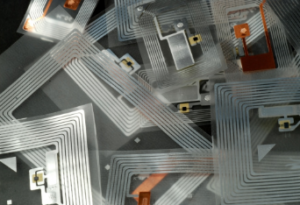Updated on August 18, 2023
RFID for Retail Inventory Management
Retailers of any size and smaller store owners can benefit from RFID systems for inventory control. But before investing in one system, it’s essential to understand its workings and potential advantages.
 RAMP-RFID retail inventory management systems offer numerous benefits, not the least of which is increased inventory accuracy. They eliminate the need for time-consuming manual barcode scanning and touch-and-counting operations that could otherwise take hours.
RAMP-RFID retail inventory management systems offer numerous benefits, not the least of which is increased inventory accuracy. They eliminate the need for time-consuming manual barcode scanning and touch-and-counting operations that could otherwise take hours.
Improved Inventory Accuracy
Retail stores are becoming increasingly important in delivering customers’ omnichannel shopping experiences, so retailers are searching for ways to enhance inventory accuracy in-store. RAMP-RFID retail inventory management can assist retailers by providing more precise inventory cycle counts and item retrieval than traditional barcode-based methods.
Incorrect stock numbers can result in lost sales and financial harm since a customer could have purchased each inaccurately inventoried item. Furthermore, retailers whose inventory levels do not match market demand may find excess items sitting on shelves or in storage – costing them money for warehousing and other expenses.
Retail stores must take a holistic approach to inventory accuracy by adopting changes that affect store and supply-chain processes. It involves making cross-functional changes to merchandising, product design, manufacturing, and improving store inventory-related procedures.
Inventory accuracy is essential for superior customer service and exceeding omnichannel fulfilment expectations. Retailers can meet customers’ needs in various ways, such as providing more convenient pickup options or sending items directly to a customer’s doorstep.
Store RFID stock management can also save labour hours on inventory-related tasks like checking stock levels and replenishing shelves. It could save a business up to 15% of its warehouse staffing expenses.
RFID can also monitor and analyse stock movement across retail store shelves and cases. It helps store operators better determine the status of a product or case when it leaves their warehouse and alerts them to possible product loss or theft.
Enhanced Customer Service
In today’s retail environment, customers expect to find all their needs in one location. RFID technology can help retailers meet these expectations and enhance customer service levels.
RAMP-RFID retail inventory management technology is widely employed for inventory tracking and supply chain management. However, it also has the potential to enhance customer experiences and increase revenue.
Major retailers can require vendors and manufacturers to tag their goods using a specific protocol and software while monitoring shipment progress through the supply chain to guarantee items don’t get lost or delayed during transport.
Increased Productivity
Inventory management in retail stores is an integral component of any successful business. A well-designed RFID system can help minimise time spent on stock-taking, freeing your staff to focus on sales and customer service activities.
RFID can also help you reduce labour costs and simplify processes like shipment verification, inventory tracking, counting, and check-ins. Furthermore, its long read range improves visibility while processing large amounts of data more quickly.
Retailer inventory accuracy can have a considerable effect on their profitability. Neglecting to count inventory correctly leads to missed sales opportunities and costs associated with replacement items.
This innovation can be a game-changer for many retailers. It will significantly reduce restocking expenses, expedite replenishments and enable them to cater to popular shopping trends such as BOPIS (buy online, pickup in-store).
Improved Security
RFID is a cutting-edge technology that enables retailers to monitor their inventory in real time. Not only does it improve stock accuracy, but it also helps them reduce theft and loss.
This technology captures data through an electronic tag containing unique data, such as a product’s SKU number. Then, an antenna transmits this information to a reader, which converts it into digital signals and sends them to a database. After analysis of this data by software, actionable reports can be generated that help improve efficiency, operations, and inventory management.
Retailers that use RFID to track inventory can monitor product movement and traffic patterns, helping them create efficient store layouts that maximise space while cutting labour costs. It improves customer service, reduces product waste, and increases sales.
It can aid them in creating an efficient loss prevention strategy, helping to avoid such incidents from occurring in the first place. Furthermore, it provides them with crucial information about an item if it’s stolen, such as its SKU number, colour and size.
Many retailers have begun incorporating RFID technology to enhance the in-store experience. Those selling high-end items or having strong omnichannel sales mainly invest in this technology.
